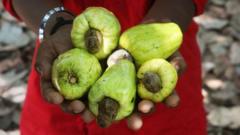Ghana is rich in cashew nut resources, but local farmers struggle to gain fair compensation as the majority of the crop is exported unprocessed.
Ghana's Cashew Challenge: Unraveling the Export Dilemma

Ghana's Cashew Challenge: Unraveling the Export Dilemma
Ghana faces hurdles in maximizing its cashew nut profits despite being a leading exporter.
Ghana, known for its prime cashew nut production, is grappling with maximizing profits from this lucrative crop. As the world's third-largest exporter after Ivory Coast and Cambodia, the pattern of unprocessed exports significantly hampers local farmers' earnings.
While wandering through Accra, a street vendor's pricing for a 30g bag of roasted cashews caught my attention. The bag, selling for approximately 75 cents, is a staggering 4,000% markup compared to the raw, unshelled cashews sourced from Ghanian farmers, showcasing an alarming disconnect between local producers and market pricing.
Approximately 300,000 locals depend on cashew farming for their livelihoods, yet the realities are grim. Nashiru Seydou, a farmer from the northeast, emphasizes the challenges posed by unstable supply chains and volatile prices, noting he earns about $50 for a hefty 100kg sack of his crop.
According to economic analyst Bright Simons, there’s a vast profit disparity; while farmers receive around $500 for a tonne of unshelled cashews, processors sell them for between $20,000 and $40,000 after roasting. Ghana produces around 180,000 tonnes of cashews yearly, with 80% being exported raw, amounting to around $300m in revenue cut off from added local value.
Efforts for change are present, as Mildred Akotia, founder of Akwaaba Fine Foods, strives to boost local processing. However, her company’s capacity is limited to just 25 tonnes annually due to the high costs of machinery and loans with interest rates reaching 30%. As a result, less than 20% of national production is processed in Ghana.
Despite some domestic processing facilities, imported cashews are resold at competitive rates, even after incurring hefty shipping costs. Past government initiatives to cut off raw cashew exports to support local processing backfired, leading to a collapse in raw nut prices and abandoning the initiative within weeks amid protests from farmers.
Recent discussions around tariff increases and potential bans on direct purchases from farmers suggest a renewed focus on policy changes, but experts like Simons argue that bolstering the local consumer base and improving entrepreneurial practices should take precedence.
Prominent economist Prof. Daron Acemoglu echoes this sentiment by highlighting the necessity of granting better access to international markets and improving local infrastructure, ultimately enhancing market competitiveness.
There is optimism with entrepreneurs like Akotia who aim to expand their businesses, eyeing international markets while managing local demands. With aspirations to establish a logistics network and enhance branding for processed foods, she is determined to spur change in Ghana’s cashew landscape.
As Ghana navigates its way through these challenges, developing a sustainable local market for cashews emerges as an essential step toward creating fairer profits for farmers and boosting the industry as a whole.
While wandering through Accra, a street vendor's pricing for a 30g bag of roasted cashews caught my attention. The bag, selling for approximately 75 cents, is a staggering 4,000% markup compared to the raw, unshelled cashews sourced from Ghanian farmers, showcasing an alarming disconnect between local producers and market pricing.
Approximately 300,000 locals depend on cashew farming for their livelihoods, yet the realities are grim. Nashiru Seydou, a farmer from the northeast, emphasizes the challenges posed by unstable supply chains and volatile prices, noting he earns about $50 for a hefty 100kg sack of his crop.
According to economic analyst Bright Simons, there’s a vast profit disparity; while farmers receive around $500 for a tonne of unshelled cashews, processors sell them for between $20,000 and $40,000 after roasting. Ghana produces around 180,000 tonnes of cashews yearly, with 80% being exported raw, amounting to around $300m in revenue cut off from added local value.
Efforts for change are present, as Mildred Akotia, founder of Akwaaba Fine Foods, strives to boost local processing. However, her company’s capacity is limited to just 25 tonnes annually due to the high costs of machinery and loans with interest rates reaching 30%. As a result, less than 20% of national production is processed in Ghana.
Despite some domestic processing facilities, imported cashews are resold at competitive rates, even after incurring hefty shipping costs. Past government initiatives to cut off raw cashew exports to support local processing backfired, leading to a collapse in raw nut prices and abandoning the initiative within weeks amid protests from farmers.
Recent discussions around tariff increases and potential bans on direct purchases from farmers suggest a renewed focus on policy changes, but experts like Simons argue that bolstering the local consumer base and improving entrepreneurial practices should take precedence.
Prominent economist Prof. Daron Acemoglu echoes this sentiment by highlighting the necessity of granting better access to international markets and improving local infrastructure, ultimately enhancing market competitiveness.
There is optimism with entrepreneurs like Akotia who aim to expand their businesses, eyeing international markets while managing local demands. With aspirations to establish a logistics network and enhance branding for processed foods, she is determined to spur change in Ghana’s cashew landscape.
As Ghana navigates its way through these challenges, developing a sustainable local market for cashews emerges as an essential step toward creating fairer profits for farmers and boosting the industry as a whole.





















